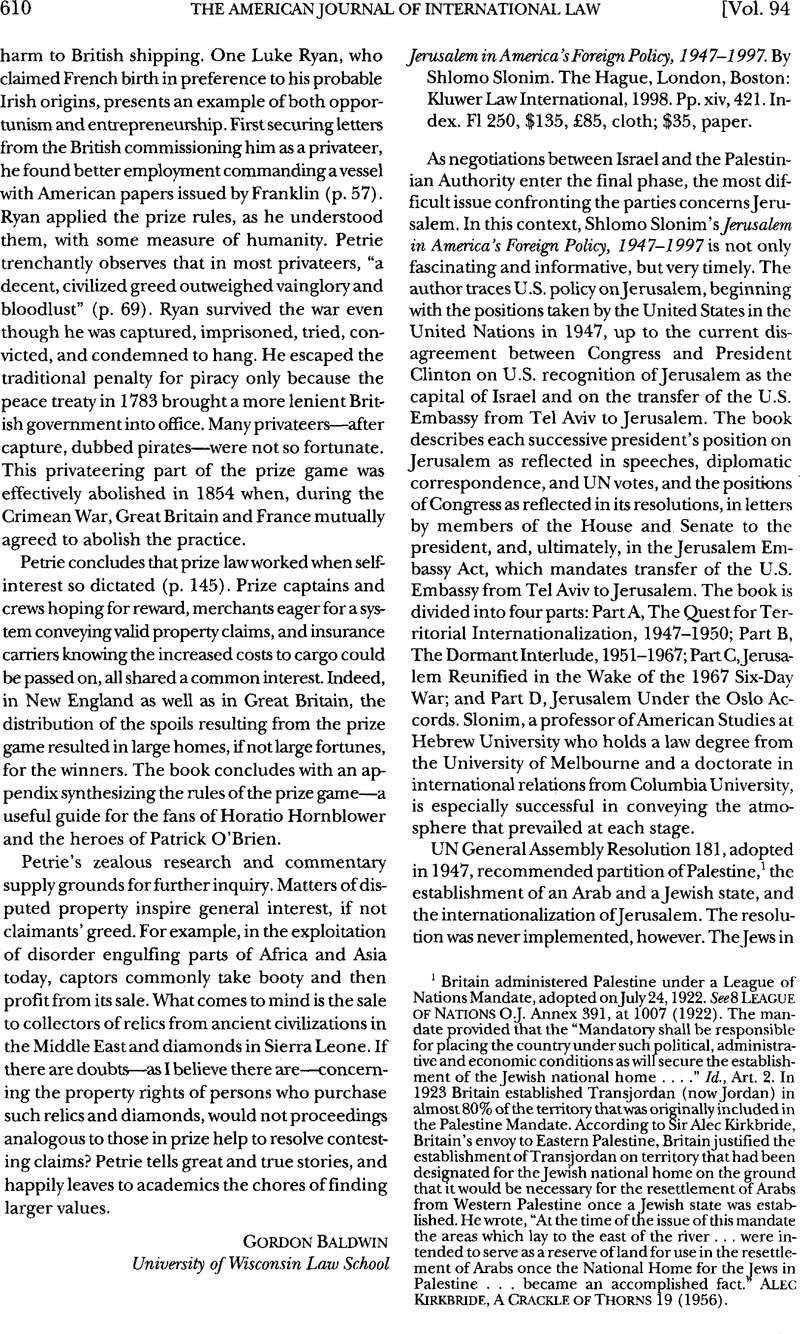Article contents
Jerusalem in America’s Foreign Policy, 1947-1997. By Shlomo Slonim. The Hague, London, Boston: Kluwer Law International, 1998. Pp. xiv, 421. Index. Fl 250, $135, £85, cloth; $35, paper.
Published online by Cambridge University Press: 27 February 2017
Abstract

- Type
- Book Reviews and Notes
- Information
- Copyright
- Copyright © American Society of International Law 2000
References
1 Britain administered Palestine under a League of Nations Mandate, adopted on July 24, 1922. See 8 League of Nations O.J. Annex 391, at 1007 (1922). The mandate provided that the “Mandatory shall be responsible for placing the country under such political, administrative and economic conditions as will secure the establishment of the Jewish national home . . . .” Id., Art. 2. In 1923 Britain established Transjordan (now Jordan) in almost 80% of the territory that was originally included in the Palestine Mandate. According to Sir Alec Kirkbride, Britain’s envoy to Eastern Palestine, Britain justified the establishment of Transjordan on territory that had been designated for the Jewish national home on the ground that it would be necessary for the resettlement of Arabs from Western Palestine once a Jewish state was established. He wrote, “At the time of the issue of this mandate the areas which lay to the east of the river . . . were intended to serve as a reserve of land for use in the resettlement of Arabs once the National Home for the Jews in Palestine . . . became an accomplished fact. Kirkbride, Alec, A Crackle of Thorns 19 (1956)Google Scholar.
2 President Truman reportedly stated that “the State Dept. has reversed my Palestine policy . . . . There are people on the third and fourth levels of the State Department who have always wanted to cut my throat. They’ve succeeded in doing it” (p. 62 n.38; see also p. 63 n.40).
3 President Truman recognized the new state of Israel eleven minutes after it was proclaimed.
4 David Ben Gurion, the first prime minister of Israel, stated: “For the State of Israel there has always been and always will be one capital only—Jerusalem the Eternal. Thus it was 3, 000 years ago—and thus it will be, we believe, until the end of time” (p. 144).
5 Slonim notes that Daniel Pipes, a prominent authority on the Middle East, believes that “Muslim interest lies not so much in controlling Jerusalem as in denying control over the city to anyone else” (p. 324 n.56, citing Daniel Pipes, If I Forget Thee: Does Jerusalem Really Matter to Islam? New Republic, Apr. 28, 1997, at 18).
6 Thirteen states moved their embassies from Jerusalem. The administration’s failure to veto the resolution was sharply criticized by Senator Moynihan.
7 Ambassador Goldberg wrote a letter to the New York Times that stated, in part:
The facts are that I never described Jerusalem as occupied territory. Ambassador Yost did, in his speech of July 1, 1969, under instructions from President Nixon, and his statement represented a departure from the policy I, President Johnson and the Department of State pursued with respect to Jerusalem during the period of my tenure.
. . . .
Resolution 242 in no way refers to Jerusalem, and this omission was deliberate.
P. 202, quoting Arthur J. Goldberg, N.Y. Times, Mar. 12, 1980, at 26.
8 A chart shows the Jewish, Christian, and Muslim populations in Jerusalem from 1844 to 1967 (p. 13 n.15)Google Scholar.
9 Jerusalem Embassy Act of 1995, Pub. L. No. 104–45, 109 Stat. 398 (1995) [hereinafter Embassy Act].
10 See U.S. Const. Art. 1, §7, cl. 2.
11 Embassy Act, supra note 9, §3 (a).
12 Id . §4.
13 Id. §§5–6.
14 Id. §3(b).
15 Letter from Kyl, Jon, U.S. Senator, to Warren Christopher, former Secretary of State (Oct. 31, 1996)Google Scholar (on file with author) [hereinafter Letter].
16 Embassy Act, supra note 9, §7(a). President Clinton invoked the waiver on June 24 and on December 29, 1999, see 64 Fed. Reg. 33, 739, 72, 887 (1999), and again on June 16, 2000, see 65 Fed. Reg. 38, 713 (2000). The Justice Department took the position that an earlier version of the act was unconstitutional. The administration did not reassert that claim, however, either when submitting the reports required by sections 5 and 6, or when invoking the national security waiver. For a discussion of the constitutionality of the act, see Halberstam, Malvina, The Jerusalem Embassy Act, 19 Fordham Int’l L.J. 1379 (1996)Google Scholar (finding it constitutional); Turner, Robert F., Foreign Affairs Under the Constitution: Only President Can Move Embassy, Legal Times, Jan. 22, 1996, at 46 Google Scholar (finding it unconstitutional).
17 Letter, supra note 15.
18 During the discussion of the Jerusalem Embassy Act in Congress, Senator Dole, one of the original sponsors of the legislation, explained that the phrase “national security interest,” rather than “national interest,” was used in the waiver provision as a
way [of] ensuring that the waiver will not permit the President to negate the legislation simply on the grounds that he disagrees with the policy. “National security interests” is much narrower than the term “national interest”—and it is a higher standard than “national interest.” The key word is security. No President should or could make a decision to exercise this waiver lightly.
Senator Dole further stated:
The waiver authority should not be interpreted to mean that the President may infinitely push off the establishment of the American Embassy in Jerusalem. Our intent is that the Embassy be established in Jerusalem by May 1999. If a waiver were to be repeatedly and routinely exercised by a President, I would expect Congress to act by removing the waiver authority.
141 Cong. Rec. S15532 (daily ed. Oct. 24, 1995).
- 1
- Cited by


